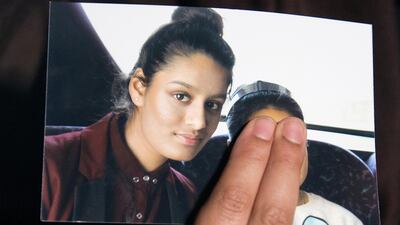Britain’s interior minister Sajid Javid deprived Shamima Begum of her citizenship to bolster his bid to become prime minister, the ISIS member’s family has claimed.
Ms Begum was a “pawn to” Mr Javid’s vanity when he took the “unilateral” and “unprincipled” decision to render the 19-year-old stateless.
“Your act represents the most profoundly egregious, capricious and politically-driven abuse of power,” lawyer Mohammed Akunjee wrote in a letter to the interior minister on behalf of the family.
Local authorities were also slammed for failing to stop Ms Begum from being "groomed" to become "a child victim of trafficking” when she left the UK in 2015 for Syria with two friends to join the terror group.
Ms Begum is one of thousands of female ISIS members residing in displacement camps in Northern Syria, following the capture of the last remnants of the terror group's territory.
She was found heavily pregnant by journalist Anthony Loyd on February 13 but less than a week later had her citizenship withdrawn on the grounds she was a threat to the public and mistaken belief she was a British-Bangladeshi dual-citizen. The baby has since died from pneumonia amid squalid conditions in the camps.
"The decision to strip Shamima of her British citizenship was an unprincipled, knee-jerk reaction to the media furore generated by her speaking of the unedifying realities of living in ISIS controlled Syria," said the family in a letter carried by The Times.
Ms Begum has never visited Bangladesh or applied for citizenship. The country’s foreign minister has said people found guilty of terrorism charges would be hanged.
In Mr Akunjee’s letter he said Ms Begum’s parents had not been told she had been interviewed at school by police after a friend went to Syria. If they had been informed, it is claimed the family could have prevent Ms Begum going to join ISIS soon after.
“Due to systemic failures in child safeguarding, she managed to travel to Syria from her home in London using a British passport,” said the family’s letter.
Similarly Mr Javid was asked why Ms Begum and her friends were not referred to a de-radicalisation programme despite authorities knowing the friend was likely to have joined extremists in Syria. The friend “groomed” and “brainwashed” Ms Begum, said the letter.
“To date no serious case review of the circumstances around the handling of the three girls matter, arguably the worst case of child radicalisation in the western hemisphere,” it added.
In interviews with Ms Begum she has asked for forgiveness and portrayed herself as a stay-at-home mother. Some reports have painted her as a violent “enforcer” responsible for ensuring people abide by ISIS’s strict rules. At 15 she married a 23-year-old Dutch ISIS fighter and as a result is a victim of statutory rape, said her family.
Ms Begum’s sister, Renu, said Mr Javid has stolen any “hope that we could rebuild something of our family”.


